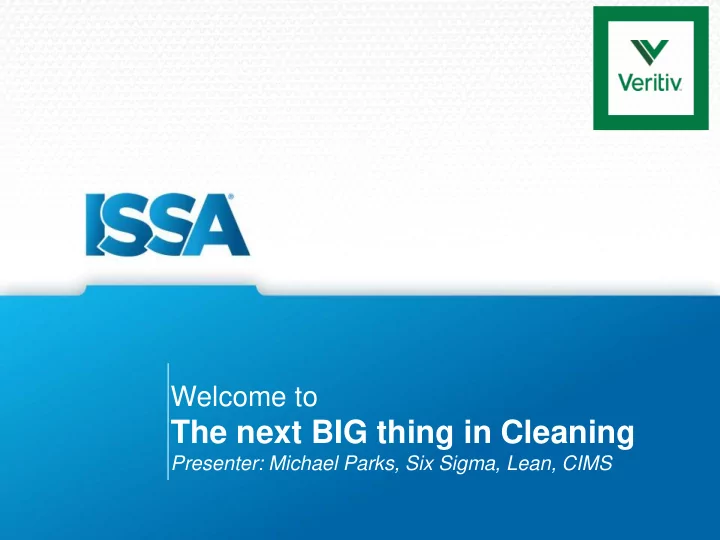

Welcome to The next BIG thing in Cleaning Presenter: Michael Parks, Six Sigma, Lean, CIMS
Learning Objectives Awareness of what Lean is- and is not! Understanding of core principles Insights to practical application
History of Lean Kiichiro Toyoda Taiichi Ohno Henry Ford 3
What is Lean? Six Sigma LEAN Kaizen 4
LEAN Principles can be applied to any industry
Have you LEANed LEAN your C ing? 6
When it comes to Cleaning, does your company have a “Housekeeping” Mentality? Do you view cleaning as a necessary evil? Is it assigned less importance? Not given enough focus? Shortcuts taken?
WHAT IS THE RESULT? Waste and an overall facility that suffers 8
Its it time for a new way to manage cleaning? 9
Are you delaying costs and taking shortcuts? HUGE EXPENDITURES FOR REPAIR AND REPLACEMENT DELAYED DETERIORATION COSTS and LESS ENGAGED OF THE CLEANING EMPLOYEES ENVIRONMENT SHORTCUTS WITH LOW MORALE 10
The High Cost of Employee Disengagement 32.7% Average of 3% Decrease in Operating Lower Earnings Income Per Share
The Benefits of Engaged Employees 20% 3X More Better Creativity Performance And Ideas On Average
Workplace Environment and Employee Emotional Health WHAT IS THE BENEFIT OF LEAN? Empowerment Higher Morale Engagement
greater likelihood of success when companies do all the right things, make sure employees feel appreciated, and have the tools to do their jobs* *Based on Gallup study *Based on Gallup study 14
What Lean is not A secret plan to reduce headcount A way to put even more on the back of the cleaning department Further reduce the value of cleaning 15
What is Lean? Simple Highly Effective Eliminating waste 5 S is a workplace creates processes organization method that need less human that uses 5 S words effort, less space, to describe how to less capital, less time or orga ganiz nize a work to achieve clean; space for ef effi ficien ciency improves quality. and ef effec ectiv tiven enes ess. s. 16
The “Clean” application of 5S sort elimination of unnecessary materials to make an environment less cluttered set in order organizing things in their right place to make an environment more orderly shine sweep, sanitize or scrub an environment standardize work rules, visuals, instructions, signoff sustain ensuring lean changes stick 17
Two Governing LEAN Principles PRINCIPLE TWO: PRINCIPLE ONE: What is the customer Pursuit of perfection willing to pay for? 18
Another way to view 100% Value Added C L E A N I N G 8 HOUR STANDARD SHIFT Non-Value Added Time 19
Another way to view 100% Value Added C L E A N I N G 8 HOUR STANDARD SHIFT Non-Value Added Time Le Leaving ving an an un un- • Getting ready to work orga or ganiz nized ed spa space ce, , wor ork k • Looking for tools, equipment, supplies un undo done ne, , un unreso esolv lved ed • Waiting for other departments issues, fr issues, frust ustrate ted d • Working inefficiently emp emplo loyee ees • Rework loops • Retracing steps • Putting things away 20
Why do we Sort? Simply, to remove unnecessary items from the workplace that no longer add value.
How do we Sort? Essentially: Just Decide Stay or ?
Why Set In Order? In other words, To arrange all we should place necessary items things we use in way to most often close maximize to us in a clearly economy of labeled and movement designated space.
How do we SIO? 3 Understand Decide Placement Decide How Placed Simple S Simple Steps teps
How things Example: should be stored The Normal Lean Just ust bec because ause we no e now kno w know w wher here thi e things ngs ar are l e loca ocated i ted it t does not alw do es not always ays mea mean n the they y ar are ea e easy sy to ge to get
Ergonomics/Safety
Standardize? Why do we Simply, to ensure everyone knows what to do. And, resist the tendency to slide backwards.
Standardize? How do we 3 Establish the standard Make them visual Educate Simple S Simple Steps teps
Why do we Sustain? To make lasting improvements that can be measured and can drive other improvements over time. To build a culture of continuous improvement leading towards excellence
Sustain How do We 3 Be Present Constant Attention Educate Simple S Simple Steps teps
Eliminate variety of wastes that “Housekeeping” mentality generates EVERY company can benefit from applying Lean principles Realize the positive strategic effects of 5WHY’s
Have you Leaned your CLEANing? Eliminate variety EVERY company Realize the of wastes that can benefit from positive strategic “Housekeeping” applying Lean effects of 5Y mentality generates principles 32
Embrace 5 WHY’s! 1. Increased productivity 2. Enhanced company image 3. Improved morale & engagement 4. Making every dollar count 5. Protection of valuable assets 33
Questions? Thank You 34
Recommend
More recommend